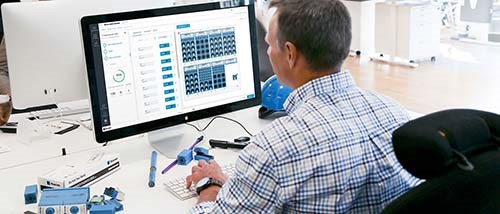We are determined to fight poverty by encouraging entrepreneurship. We are, for example, partnering with the non-profit organization Hand in Hand to fight poverty in rural India.
Sponsoring villages in India
We have been engaged in collaboration projects in Kurumbapatty (2015-2017), Bhilai (2018-2020), and Mogra Kalan (2021-2023). As sponsor of Hand in Hand’s Village Uplift Program, which provides help today, and self-help abilities for tomorrow, we have supported improvements in mainly five focus areas:
• Child labor elimination and school for dropouts
• Self-Help Groups and microfinance for women
• Internet access and grass-root level democracy
• Health education and free medical examination
• Environmental solutions for waste and resources
Positive impact from the Roxtec sponsorship
According to the final Hand in Hand report from Mogra Kalan in the Jodhpur district of Rajasthan, 93 new companies and 100 new jobs were created during the 24-month village uplift program. 15 Self-Help Groups involving 150 women in the age of 18 to 60 years, and in total 180 community members were mobilized. Dozens of project participants got access to microloans for family-based enterprises.
One objective was to help villagers develop opportunities for sustainable income. The income of the participants increased by 63% during the program. Among the activities were the formation of Self-Help Groups for women empowerment and trainings in skill development, business development and trade. All groups became functioning with regular meetings, internal lending, repayment, and documentation.
Bringing children back to school
Mass awareness programs and other focused awareness campaigns gave a better knowledge of health and sanitation and a better understanding of social and civil rights as well as insights in the importance of education. The child labor elimination program provided important help and brought children from labor and back into education. 50 children were, for example, engaged in using child learning centers or special coaching centers, and 21 children were enrolled and mainstreamed in government schools.
Great results of the program in Bhilai
Several great outcomes of the program in Bhilai (2018-2020) were presented in the final report:
- Women empowerment created new jobs
All together 141 women became members of twelve Self-Help Groups. The group members attended basic training as well as enterprise development training. Many of them benefitted from microloans making it possible to invest in for example livestock and sewing machines. They also gathered in a cluster level network to provide social and economic capital at a larger scale.
- Help with nutrition for women and children
The program helped organize numerous awareness meetings and trainings on anemia, nutrition, and healthcare as well as pediatric camps, diabetic screening camps and cardiovascular disease screenings. It made it possible to provide anemic women with iron supplement tablets and enabled the distribution of efficient nutrition powder to children who were underweight. Thanks to a close follow-up of these children, they were no longer underweight or malnourished.
- Educational efforts and veterinary camps
There were trainings on everything from business development and tailoring through to milk yielding animals, goat farming and digital literacy. Hundreds of people also had the possibility to attend awareness meetings on human rights, educational rights, and government schemes. The veterinary camps, treating 1,602 animals, were very helpful in controlling seasonal diseases.
“It is wonderful to see how our contribution is used to enable a direct positive change for so many people. It is also great that the activities are performed in a long-term perspective and with ecology and sustainability in mind,” says Ulrica Malmberg, Roxtec's Executive Vice President Human Resources.
In a social audit, the villagers gave the program a successful score of 94 out of 100. Hand in Hand India continues to monitor Bhilai village to ensure that the development is sustainable.
The difference in numbers from Kurumbapatty
The Roxtec collaboration with Hand in Hand in Kurumbapatty (2015-2017) achieved the following:
Education
- 1,495 people attended awareness programs on child labor. The village was declared "Child friendly", which means that child labor is eliminated and that all children go to school. 97 children who were not present on a regular basis or full time returned to school.
- 165 people attended computer courses and increased their possibilities to get jobs.
- 1,447 people attended meetings on rights to information and grassroots democracy.
Health
- 3,429 people attended awareness meetings and camps on health.
- 31 toilets were constructed. The government were to construct the rest of the toilets.
- 22 more women were out of anemia and 15 more children were out of malnourishment.
Empowerment
- All 264 women in the Self-Help Groups attended training in enterprise development.
- 282 family-based companies were created, many of them thanks to microfinance loans. The loans were not granted by sponsors, but by Hand in Hand's microfinance loan institute. The loans are often recovered within just three months – and the recovery degree is 99,6%.
- 111 kitchen garden units and 59 azolla (protein-rich cattle feed) units were promoted.
